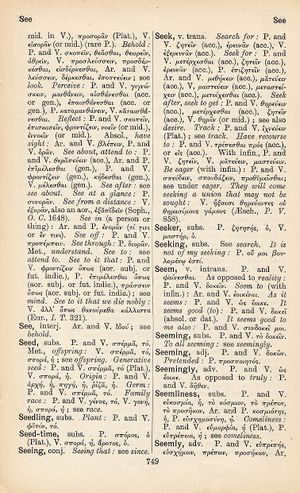seem: Difference between revisions
From LSJ
πρὸ τελευτῆς μὴ μακάριζε μηδένα, καὶ ἐν τέκνοις αὐτοῦ γνωσθήσεται ἀνήρ → Count no man blessed before his end; a man will be recognized in his offspring. (Ecclesiasticus 11:28)
(Woodhouse 4) |
(CSV5) |
||
| Line 1: | Line 1: | ||
{{ | {{Woodhouse1 | ||
| | |Text=[[File:woodhouse_749.jpg|thumb|link={{filepath:woodhouse_749.jpg}}]]'''v. intrans.''' | ||
P. and V. [[φαίνω|φαίνεσθαι]]. | |||
As opposed to <b class="b2">reality</b>: P. and V. δοκεῖν. | |||
<b class="b2">Seem to</b> (with infin.): Ar. and V. ἐοικέναι. | |||
<b class="b2">As it seems</b>: P. and V. ὡς ἔοικε. | |||
<b class="b2">It seems good</b> (<b class="b2">to</b>): P. and V. δοκεῖ (absol. or dat.). | |||
<b class="b2">It seems good to me also</b>: P. and V. συνδοκεῖ μοι. | |||
}} | }} | ||
Revision as of 10:02, 21 July 2017
English > Greek (Woodhouse)
v. intrans.
P. and V. φαίνεσθαι.
As opposed to reality: P. and V. δοκεῖν.
Seem to (with infin.): Ar. and V. ἐοικέναι.
As it seems: P. and V. ὡς ἔοικε.
It seems good (to): P. and V. δοκεῖ (absol. or dat.).
It seems good to me also: P. and V. συνδοκεῖ μοι.

